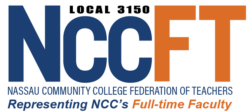Question: Is Blackboard training mandatory? Does the college have the authority to require faculty who are teaching virtually, whether fully online or remotely, to use Blackboard?
Answer: The short answer to both these questions is yes. First, Section 9-4.3 of our contract—“The College shall determine the course management system to be used”—states very clearly that the choice of course management system is up to the college. From that, it follows logically that the college would have the authority to require that faculty be properly trained in the use of that system. Indeed, Blackboard training has always been required for those faculty members who want to teach online and/or hybrid courses, as those methods of delivery are defined in sections 9-1.1 and 9-1.3 of the contract, and this training has always had two components:
- The minimum standard set by the college, which is Getting Started in Blackboard 1 & 2
- Whatever other requirements have been established by your department in order for you to be able to teach online.
In an email dated April 28th, President Williams made it clear that, with “the support…of the Academic Senate Executive Committee,” these requirements would be extended to remote teaching as well. He wrote, “all course materials and assessments (i.e., exams, quizzes, homework, etc.) [in a remote class] have to be administered via Blackboard.” Then, in an email dated May 21st, former AVP Valerie Collins explained this policy in more detail:
For Fall 2020, the mode of remote instruction will be videoconferencing (e.g., Zoom or Skype) during the scheduled class time listed on Banner. All course materials and assessments (e.g., PowerPoints, videos, web links, tests, and assignments) will be administered via the Blackboard learning management system.
In addition to the minimum qualifications set by each department, completion of the following NCC training sessions will be required to facilitate remote instruction:
-
- Getting Started in Blackboard 1 and 2.
Additional workshops recommended (as per department/faculty/course) include Tests; Assignments; Grade Center; Discussions; Kaltura media and Zoom videoconferencing.
Digital Badges will be provided by the Office of Distance Education at the completion of all training sessions.
For the Fall 2020 semester, faculty will have until August 14, 2020, to complete the training for Blackboard 1 and 2 and email those digital badges to the Chair of their department. [Editor’s note: Since Dr. Collins sent this email, the process has changed. Distance Education now provides chairs with a list of faculty and the training sessions they have attended.] Faculty who had prior training in Blackboard at NCC or elsewhere should discuss their proficiency with their Chairperson to determine if additional training is necessary. (Emphasis added)
So, to return to the original questions:
- Is Blackboard training mandatory?
- Does the college have the authority to require faculty who are teaching virtually, whether fully online or remotely, to use Blackboard?
The college policy—arrived at (as per President Williams’ email) in consultation with the Academic Senate Executive Committee—is clear. The answer to both questions is yes. If you have any questions or concerns about how this policy impacts your individual situation, please contact the union office, nccft@ncc.edu, and a member of the executive committee will get back to you.
“Asked & Answered” is a regular blog feature in which we answer members’ questions. If you have a question that you would like us to answer in a future Asked & Answered post, please send it to the NCCFT Office. We welcome and encourage frank and open discussion in the “Comments” section. (Please read our comments policy to learn more.) However, if your comment is or contains a question to which you would like a direct response from the Executive Committee, please send that question to the NCCFT Office for potential inclusion in a future Asked & Answered post. (We cannot guarantee that all questions will become such posts, but we will respond to all questions that the office receives.)

2 Responses
This requirement was fine when a faculty member decided to teach a distance learning course but NOT when it is mandated that all courses are distance learning. Most of us have our own methods of teaching our courses that we have spent many hours perfecting since March. It makes no sense to me why the NCCFT is not fighting this. This is one more step in the ongoing process to take away academic freedom.
I find it disconcerting that our union continues to accept whatever management comes up with. At the very least the union’s voice should reassure us that it is carefully screening and questioning the directives that come from our administrators. Why would you quote the President and Vice Presidents’ interpretation of our contractual rights as though they have the final say?
If the union officers look at the union contracts from the year 2005 to the present, they will see how faculty working conditions and faculty input have eroded to the point where our subsequent contracts provide little more than salary Increases.
The loss of the Academic Senate’s participation in approving curricular and other policies is the most blatant
example of a union’s failure to advocate for its members.
This Fall the opportunity to change the union officers will hopefully result in a more responsive and more powerful uinion.